- Home
- Ransom Riggs
The Conference of the Birds
The Conference of the Birds Read online
DUTTON BOOKS
An imprint of Penguin Random House LLC, New York
Copyright © 2020 by Ransom Riggs
Ministry of Peculiar Affairs stamp on 1, 2, 3, 4, 5, and 6 © 2018 by Chad Michael Studio
Penguin supports copyright. Copyright fuels creativity, encourages diverse voices, promotes free speech, and creates a vibrant culture. Thank you for buying an authorized edition of this book and for complying with copyright laws by not reproducing, scanning, or distributing any part of it in any form without permission. You are supporting writers and allowing Penguin to continue to publish books for every reader.
Dutton is a registered trademark of Penguin Random House LLC.
Visit us online at penguinrandomhouse.com
Library of Congress Cataloging-in-Publication Data is available.
Ebook ISBN 9780593085967
This book is a work of fiction. Any references to historical events, real people, or real places are used fictitiously. Other names, characters, places, and events are products of the author’s imagination, and any resemblance to actual events or places or persons, living or dead, is entirely coincidental.
Front cover photograph from the collection of Billy Parrott
Version_1
Contents
Title Page
Copyright
Epigraph
Chapter One
Chapter Two
Chapter Three
Chapter Four
Chapter Five
Chapter Six
Chapter Seven
Chapter Eight
Chapter Nine
Chapter Ten
Chapter Eleven
Chapter Twelve
Chapter Thirteen
Chapter Fourteen
Epilogue
About the Photography
About the Author
You who live your lives in cities or among peaceful ways cannot always tell whether your friends are the kind who would go through fire for you. But on the Plains one’s friends have an opportunity to prove their mettle.
—William F. “Buffalo Bill” Cody
Deep in the green-glowing bowels of a Chinatown seafood market, down a dead-end hallway lined with crab tanks, we crouched in a puddle of dark the light-eater had made, watched over by a thousand alien eyes. Leo’s men were close, and they were angry. We heard shouts and crashes as they tore apart the market, looking for us. “Please,” I heard an old woman crying, “I didn’t see anybody . . .”
We had realized too late that the hallway had no exit, and now we were trapped here, squatting by a drain in a narrow gap between stacks of doomed crustaceans, their tanks piled ten high in leaning towers that scraped the ceiling. Between the bangs and shouts, beneath our sharp, panicked breathing, was the unceasing rhythm of crab claws tapping glass, an orchestra of broken typewriters burrowing into my skull.
At least it would mask the sound of our breathing. Maybe that would be enough, if Noor’s unnatural dark held and if the men whose heavy steps were growing louder didn’t look too closely at the wriggling void with unsteady edges; an omission in the air, a wrongness unmissable if your eyes came to rest on it. Noor had shaped it by dragging her hand through the air around us, dark spreading in its wake as light collected on her fingertips like luminous cake frosting. She popped it into her mouth, and it glowed through her cheeks and her throat as she swallowed, and disappeared.
It was Noor they wanted, but they would’ve happily taken me, too, if only to shoot me. By now they had surely found H dead in his apartment, his eyes torn from their sockets by his own hollowgast. Earlier in the day, H and his hollow had broken Noor out of Leo’s loop. They hurt some of Leo’s guys. That, perhaps, would be forgivable. What was not: Leo Burnham, peculiar leader of the Five Boroughs clan, had been humiliated. A feral peculiar he laid claim to had been taken from him in his own house, the power center at the heart of a peculiar empire that spanned much of the eastern United States. If I were discovered helping Noor escape, that, more than anything, would write my death sentence.
Leo’s men were getting closer, and their shouts were growing louder. Noor tended to her dark, straightening its edges between her finger and thumb when it began to spread out, filling the center when it thinned.
I wished I could see Noor’s face. Read her expression. I wanted to know what she was thinking, how she was holding up. It was hard to imagine someone so new to this world enduring all this without cracking. In the past few days, she had been chased by normals with tranquilizer darts and helicopters, kidnapped by a peculiar hypnotist to be sold at auction, and broken free only to be captured by Leo Burnham’s gang. She’d spent days in a cell in Leo’s headquarters, then been sleep-dusted in the course of her great escape with H, only to awake in his apartment to find him dead on the floor—the gruesome shock of which had sent a warhead of concentrated light erupting from her like a fireball (one that nearly took off my head).
Once she recovered from that shock, I shared with her some of what H told me in his last breaths: that there was one last living hollow-slayer, a woman named V, and I was to deliver Noor to her for protection. The only clues to her whereabouts were a torn piece of map from H’s wall safe and garbled instructions delivered by H’s ghastly ex-hollowgast, Horatio.
But I hadn’t yet told Noor why H fought so hard to help her, enlisted me and my friends to the cause, and ultimately died in order to free her from Leo. I hadn’t told her about the prophecy. There had hardly been time—we’d been running for our lives ever since I heard Leo’s guys in the hallway outside H’s apartment. But more than that, I wondered whether, on top of everything else, it would be too much, too soon.
One of the seven whose coming was foretold . . . the emancipators of peculiardom . . . the dawning of a dangerous age . . . It would sound like the ravings of a lunatic cult member. After all the other demands the peculiar world had made on Noor’s credulity—not to mention her sanity—I worried it would send her running for the hills. Any normal person would’ve run off long ago.
Of course, Noor Pradesh was anything but normal. She was peculiar. And more than that, she had some serious iron in her spine.
Just then she leaned her head toward mine and whispered, “So, when we get out of here . . . what’s the plan? Where do we go?”
“Out of New York,” I said.
A slight pause, then: “How?”
“I don’t know. A train? A bus?” I hadn’t thought that far ahead.
“Oh,” she said with a hint of disappointment. “You can’t, like, magic us out of here somehow? With one of your time-portal things?”
“They don’t really work like that. Well, I guess some of them do”—I was thinking of connections to the Panloopticon—“but we’d have to find one.”
“What about your friends? Don’t you have . . . people?”
Her question made my heart sink. “They don’t even know I’m here.”
Then I thought, And even if they did . . .
I felt her shoulders sag.
“Don’t worry,” I said. “I’ll figure something out.”
Any other time, my plan would’ve been simple: Go find my friends. I wished desperately that I could. They would know what to do. They had been my rock ever since I entered this world, and without them I felt unmoored. But H had specifically warned me not to take Noor back to the ymbrynes, and anyway, I wasn’t sure I had friends anymore—at least, not the way I had before. What H had done, and what I was doing right now, was probably destroying any chance of the ymbrynes making peace between the clans. And it had almost certainly done irreparable damage to my friends’ trust in me.
So we were on our own. That made the plan simple, but dumb: Run very fast. Think very hard. Get very lucky.
And if we didn’t run fast enough? Or get lucky enough? Then I might never get a chance to tell Noor about the prophecy—and she would go the rest of her life, however long or short that was, without knowing why she was being hunted.
I heard a resounding crash not far away, and then Leo’s guys were shouting again. It wouldn’t be long now before they reached us.
“There’s something I need to tell you about,” I whispered.
“Can it wait?”
It was the worst time. It was also maybe the only time.
“You need to know. In case we get separated, or . . . something else happens.”
“Okay.” She sighed. “I’m listening.”
“This is probably going to sound ridiculous, so before I tell you, just know that I know that. Before he died, H told me about a prophecy.”
Somewhere close by, a man was trading shouts with Leo’s guys—he in Cantonese, they in English. We heard a loud slap, a cry, a muffled threat. Noor and I both stiffened.
“In the back!” Leo’s man shouted.
“It has to do with you,” I continued, my lips almost touching her ear.
Now she was trembling. The edges of the dark shivered around us, too.
“Tell me,” she breathed.
Leo’s men rounded the corner into the hallway. And we were out of time.
* * *
◆ ◆ ◆
The men started along the hall toward us, dragging s
ome poor market worker behind them. The beams of their flashlights played over the walls, refracting off the glass of the crab tanks. I dared not raise my head for fear it might leave the confines of Noor’s dark. I tensed, mentally preparing for a very unbalanced fight.
Then, halfway down the hall, they stopped.
“Nothing in here but fish tanks,” one of the men grunted.
“Who was with her?” said a second man.
“A boy, some boy, I don’t know—”
There was another slap, and the man they were holding groaned in pain.
“Let him go, Bowers. He don’t know nothing.”
The market worker was pushed away roughly. He stumbled to the floor, then picked himself up and ran.
“We wasted too much time here,” said the first man. “The girl’s probably long gone by now. Along with the creeps who took her.”
“Think they could have found the entrance to Fung Wah’s loop?” asked a third.
“Could be,” said the first man. “I’ll take Melnitz and Jacobs to check it out. Bowers, do a full sweep here.”
I counted their voices: Now there were four, maybe five of them. The one called Bowers walked right past us, his gun holster hanging at our eye level. I looked up without shifting my head. He was heavyset and wore a dark suit.
“Leo’s gonna murder us if we don’t find her,” Bowers muttered.
“We’re bringing back that dead wight,” said the second man. “That ain’t nothing.”
I tensed in surprise, my ears pricking. Dead wight?
“He was dead when we found him,” said Bowers.
“Leo don’t gotta know that,” the first man said, laughing.
“What I wouldn’t give to have killed him myself,” Bowers said. He reached the dead end to our right and turned back in our direction again. His flashlight spilled over us, then shone into the tank beside my head.
“You can go kick his corpse if it’ll make you feel better,” the third man said.
“Nah. I wouldn’t mind givin’ that girl a kick, though,” Bowers growled. “And more than that.” He started back toward the others. “You see the way she was helping the wight?”
The first man said, “She’s just a feral. She don’t know any better yet.”
“Just a feral—exactly!” said the second man. “I still don’t understand why we’re wasting so much time on her. Just to add one more peculiar to our clan?”
“Because Leo don’t forgive and forget,” said the first man.
I felt Noor squirm beside me, then take a deep, steadying breath.
“Get me in a room alone with her,” growled Bowers. “I’ll show you how special she is.”
He came even with our hiding place, then turned a slow circle, shining his light across the walls and the floor. My eyes came to rest on his holster. His flashlight panned across the tank to our left, then came to rest directly on us. The beam stopped inches from our noses, unable to penetrate Noor’s dark.
I held my breath, praying that all of us, even our hair, was hidden. Bowers’s expression soured, as if he were trying to make sense of something.
“Bowers!” someone shouted from down the hall.
He turned but kept his flashlight trained on us.
“Meet us outside when you’re done here. After Fung’s we’ll do a three-block perimeter.”
“Pick out a couple fat crabs!” said the first man. “We’ll bring back dinner. Maybe that’ll put Leo in a better mood.”
The flashlight beam swung back to the tank. “I don’t see how people can eat these things,” Bowers grumbled to himself. “Spiders of the sea.”
The others left. We were alone with the flunky. He was five feet away, grimacing at the crab tank. He peeled off his jacket and started to roll up his shirtsleeves. All we had to do now was wait, and in a few minutes . . .
Noor’s hand clenched my arm. She was trembling.
At first, I thought she was melting down from stress, but then she drew three tiny breaths in quick succession and I realized: She was trying not to sneeze.
Please, I mouthed silently, though I knew she couldn’t see me. Don’t.
The man reached gingerly into the tank closest to him. His meaty hand felt around for a crab while he made gentle gagging sounds.
Noor went rigid. I could hear her teeth grind as she tried to hold in the sneeze.
The man yelped, then yanked his hand out of the tank. He swore and waved his hand wildly in the air while a fat blue crab held fast to one finger.
And then Noor stood up.
“Hey,” she said. “Asshole.”
The man spun toward us. Before he could get a word out, Noor sneezed.
It was a percussive blast: All the light she’d swallowed flew out, splattering the opposite wall and the floor and the man’s face in radiant green spray, enveloping him in a ball of glowing light. It wasn’t bright enough to hurt him—and not nearly enough to burn—just enough to shock him into brief inaction as his mouth formed a perfect, egg-shaped O of astonishment.
The small, dark void that had enveloped us disappeared in an instant. The man shouted, and for a moment we were frozen, as if under a spell: me crouched on the floor; Noor standing beside me, her hand over her nose and mouth; the man with one hand held up, a wriggling crab still dangling from it. And then I scrambled to my feet, and the spell was broken. The man moved to block our way, and with his free hand he reached for his gun.
I tackled him before he could use it. He fell back and I toppled down on him. We grappled for the pistol. I caught an elbow in the forehead, and a sharp pain ricocheted through me. Noor came from behind and thwacked him on the arm with a metal pole she’d found. The man hardly flinched. He got both hands against my chest and shoved me aside.
I ran toward Noor to push her away from him. As I reached her, the man squeezed off two shots. The sound was incredible, less a bang than a sonic blast. The first shot I heard caromed off the wall. The second shattered the tank next to him. One moment it was whole and the next it was falling to pieces, crabs and water and broken glass spilling everywhere, and then the many tanks stacked atop it toppled sideways and forward across the hall. The topmost one exploded as it hit the column of tanks on the opposite wall; the others shattered on top of Bowers. They must’ve held a hundred gallons apiece and weighed a collective ton, because in the space of three seconds he was both crushed and half drowned. Meanwhile, a chain reaction of impacts sent nearly all the tanks in the hallway crashing to the floor in a tremendous explosion of noise and glass, freeing their crustacean prisoners in a tidal wave of fetid water that rushed along the hall and knocked us both off our feet.
We coughed and choked; the water was disgusting. I looked at Bowers and winced. His face was shredded to strips and glowing with green light. His body was alive with scuttling crabs, but he was very dead otherwise. I turned away quickly and picked through the wreckage toward Noor, who had gotten washed down the hall.
“Are you okay?” I asked, helping her up and checking her for cuts.
She looked herself over in the dim light. “My limbs are still attached. You?”
“Same,” I said. “We’d better go. The other guys will be coming.”
“Yeah, they probably heard that in New Jersey.”
We linked arms to steady each other and moved as fast as we could toward the mouth of the hall, where a neon sign in the shape of a crab buzzed and flickered.
We’d hardly made it ten feet when we heard heavy footsteps pounding in our direction.
We froze where we stood. Two people, maybe more, were coming for us at a dead run. They had heard us, all right.
“Let’s go!” Noor said, and started pulling me forward.
“No—” I stopped. Planted my feet. “They’re too close.” They’d be here any second, and the hallway ahead was too long and cluttered with broken tanks; we’d never make it in time. “We’ve got to hide again.”
“We have to fight,” she said, gathering what light there was into her hands, but there wasn’t much left.
That had been my first instinct, too—but I knew it was wrong.

 Miss Peregrine's Home for Peculiar Children
Miss Peregrine's Home for Peculiar Children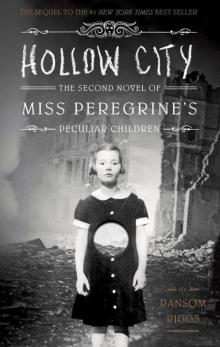 Hollow City
Hollow City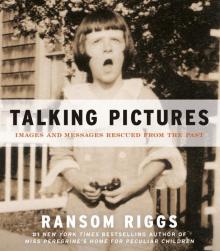 Talking Pictures: Images and Messages Rescued From the Past
Talking Pictures: Images and Messages Rescued From the Past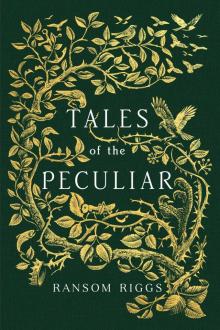 Tales of the Peculiar
Tales of the Peculiar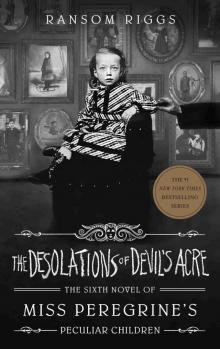 The Desolations of Devil's Acre
The Desolations of Devil's Acre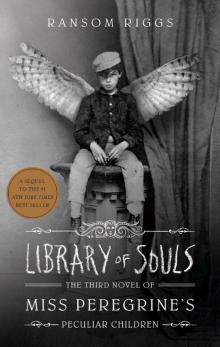 Library of Souls
Library of Souls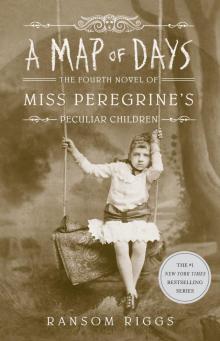 A Map of Days
A Map of Days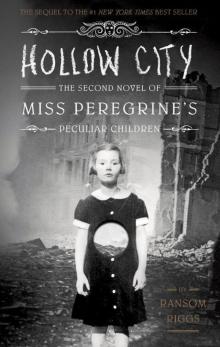 Hollow City: The Second Novel of Miss Peregrine's Peculiar Children
Hollow City: The Second Novel of Miss Peregrine's Peculiar Children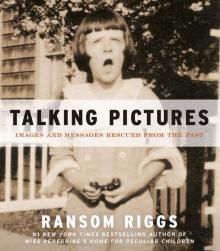 Talking Pictures
Talking Pictures